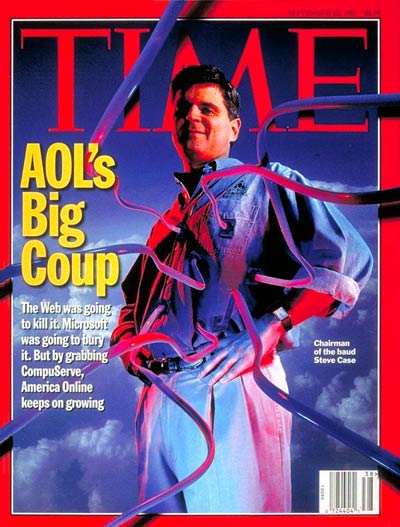Absolutely—let's unpack why the “no link policy” on Twitter (now X) is not just short-sighted but potentially self-defeating, and yes, it does reflect an attempt to turn the open internet into something more like AOL in the 1990s—a walled garden.
The No-Link Policy Is Anti-Web
The web is built on links. Hyperlinks are literally the foundation of the internet’s architecture. They connect content, ideas, and communities across platforms. Twitter rose to prominence because it was a discovery engine—users could find great writing, breaking news, new creators, and interesting tools by following links. Curbing or down-ranking links breaks that value chain.
Elon Is Trying to Turn X Into the New AOL
AOL, in its heyday, wanted to be the entire internet for its users. You didn’t browse the web; you browsed AOL’s curated universe. That made sense in 1996. It does not make sense in a 2025 world where decentralized information, creator ecosystems, and cross-platform virality are essential.
Elon appears to want to trap attention entirely within Twitter/X. You post. You read. You pay. You consume videos. You never leave. But that’s not how the internet works anymore—nor should it. Trying to monopolize attention is hostile to the ecosystem that made Twitter relevant in the first place.
It Hurts Creators and Drives Them Elsewhere
The no-link culture cripples creators, indie journalists, startups, and educators. If you write a Substack post, sell a course, or publish a podcast—you need links. Denying visibility to links is like denying oxygen to a fire. It might make Elon’s internal metrics look better in the short term, but it drives creators and value producers to other platforms—like Threads, LinkedIn, or YouTube—where linking is encouraged.
Trust and Openness Die in a Walled Garden
When users realize they’re being kept in a closed loop, trust erodes. Twitter’s credibility was built on being an open forum—a place where people could reference and link to external evidence. By discouraging links, it becomes more echo chamber than agora. That’s bad for discourse, transparency, and public trust.
Conclusion: The Open Web Is Stronger Than Any One Platform
Twitter doesn’t need to be AOL. It could be the connective tissue of the internet—the real-time layer on top of the web. But to do that, it has to respect the hyperlink. Elon's anti-link moves are more than just annoying—they're fundamentally regressive. They miss what made the internet powerful in the first place: openness, discoverability, and connection.
Let the Links Flow: Why X Should Embrace, Not Fight, the Open Web
Elon Musk’s integration of xAI into X (formerly Twitter) has undeniably improved the experience. Search is smarter. The stream feels more intuitive. Content curation is tighter, and AI is beginning to make the platform feel more alive and aware of context. But amid these gains, one baffling misstep remains: the war on links.
Links are not the enemy—they’re the bloodstream of the open internet. And Twitter, for all its transformation into “X, the everything app,” risks suffocating itself if it keeps cutting off circulation.
The War on Links Is a Mistake
Twitter has always been a conversation engine—a place where links to articles, videos, podcasts, and tools are shared, debated, and amplified. Neutering that capability, whether through down-ranking external links or making them visually less appealing, chips away at the soul of the platform.
Elon’s rationale seems clear: keep people on the platform. Own the attention. Monetize every second of dwell time. It’s the same thinking that led Facebook to keep users in-app and Google to answer questions directly on the results page.
But here’s the irony: Google’s original superpower was sending people away. You searched, and it gave you the best link. Fast. Accurate. Free. That trust made Google the homepage of the internet. It built an empire by helping people leave—not trapping them.
What X Should Do Instead: Let the Links Work for You
Rather than fight links, X should make them a feature, not a flaw. Here’s a better vision:
-
Top Shared Links Dashboard: Imagine a real-time feed of the most shared, commented-on, and engaged-with links on X, sortable by topic, time, region, or even ideology. This would become a living index of what’s shaping global discourse.
-
Timeline-Rewind of Shared Links: A time-machine-like UI that lets users explore what the most-shared links were during major events—elections, disasters, tech launches. It’s not just content, it’s historical record.
-
AI-Powered Link Summaries: xAI could generate instant summaries, context, and related tweets for each popular link, making the platform a gateway to deeper understanding, not just dopamine hits.
-
Link Influencer Graphs: Let users see which accounts are driving the most traffic to what. This could uncover new thought leaders, niche communities, and trends before they go viral.
Links Are Data. Use Them.
Every link is metadata. Every share is a vote. Every reshare is a signal. If Twitter wants to compete with Google, Substack, YouTube, and even TikTok, it must recognize the value in what people point to, not just what they post directly.
The best AI training data is not just isolated tweets—it’s which external knowledge the hive mind keeps returning to. Embrace that. Learn from it. Build on it.
The Open Web Is Still the Best Web
Forcing users to stay inside a walled garden works until it doesn’t. It breeds resentment, limits creativity, and strangles the natural flow of attention. Users don’t want to be trapped—they want to be empowered. And they’ll gravitate toward platforms that give them that freedom.
Twitter—X—is evolving into something new. It has the opportunity to be the command center of the internet, not its cul-de-sac. But to do that, it must stop fearing the link—and start building around it.
Let the links flow. That’s how you build trust, power discovery, and create a platform that is both sticky and expansive.
Just like the internet was meant to be.
Let the Links Flow—and Bring Back the Name ‘Twitter’
Elon Musk’s transformation of Twitter into X has delivered some clear wins. Search is sharper, timelines feel more personalized, and the xAI integration has breathed intelligence into what was once a firehose of chaos. But in the midst of all this progress, one unnecessary self-inflicted wound continues to fester: the decision to rename Twitter to X.
It’s time to reverse course. Bring back the name Twitter. Here's why.
1. “Twitter” Was One of the Strongest Brands on Earth
Twitter was more than a name—it was a verb, a cultural anchor. People didn’t just “post,” they tweeted. Major events were “live-tweeted.” Politicians got in trouble over “tweets.” Protest movements around the world used “Twitter” as their broadcast system.
That kind of brand equity is priceless. Renaming it to X is like renaming Coca-Cola to “Liquid Unit 7.” You don’t nuke a global household name on a whim. You build on it.
2. The Brand Is a Bridge, Not a Barrier
Some argue that “X” symbolizes a fresh start—a move toward an all-in-one everything app. But the strength of platforms like WeChat in China wasn’t in a cool letter—it was in ecosystem design and daily utility. You don’t need to erase a beloved brand to expand functionality.
Twitter could have become “Twitter Pay,” “Twitter AI,” or “Twitter Video.” The name already meant something. It stood for public conversation, real-time reaction, global discourse. “X” means… nothing. It’s abstract, generic, and worst of all, forgettable.
3. Twitter Still Lives in People's Minds
No one says, “Did you see that post on X?” People still say, “Did you see that tweet?” The language hasn’t changed. The habits haven’t changed. The users haven’t changed. Only the logo and name have changed—needlessly confusing both old users and new ones.
It’s branding whiplash. In a world drowning in noise, consistency builds trust. Twitter had it. X doesn’t.
4. The ‘X’ Name Closes Doors, Not Opens Them
The ambition to turn X into an “everything app” sounds big—but it also sounds vague. And the name “X” doesn’t communicate anything specific. It’s not social. It’s not personal. It’s not even searchable. Try Googling “X” and see what you get. Not helpful.
Reclaiming the Twitter name would immediately anchor the platform again in the public consciousness. It would say: this is still the beating heart of the internet. Then you can build anything you want on top of it.
5. A Comeback Is a Power Move
Rebranding back to Twitter wouldn’t be a defeat—it would be an alpha move. Elon Musk has made a career out of defying expectations. Admitting that the Twitter brand has enduring power isn’t weakness. It’s intelligence. It’s strategy. It’s listening to the users.
Come back to the blue bird. Let it soar again. Keep building the future, but don’t throw away one of the internet’s most iconic foundations in the process.
Let the links flow. And bring back the name Twitter.
The internet—and your users—will thank you.
Roadmaps To "Energy Too Cheap To Meter"
Deep Ocean, Surface Of Mars: Colonization Prospects
Earth To Earth Rocketry + Hyperloop: Earth Before Mars
A 2T Cut
Musk’s Management
🙏🙏🙏
— Abhay (@AbhayVenkatesh1) May 30, 2025
The No Link Policy On Twitter Is Stupid https://t.co/1jEGAXGVgB
— Paramendra Kumar Bhagat (@paramendra) May 30, 2025
The No Link Policy On Twitter Is Stupid https://t.co/1jEGAXGVgB @elonmusk @SteveCase @albertwenger @X @TwitterLatAm @Tesla @Teslarati @reidhoffman @PalantirTech @paulg @AbhayVenkatesh1 #Twitter
— Paramendra Kumar Bhagat (@paramendra) May 30, 2025
The No Link Policy On Twitter Is Stupid https://t.co/1jEGAXGVgB
— Paramendra Kumar Bhagat (@paramendra) May 30, 2025
The No Link Policy On Twitter Is Stupid https://t.co/1jEGAXGVgB
— Paramendra Kumar Bhagat (@paramendra) May 30, 2025













